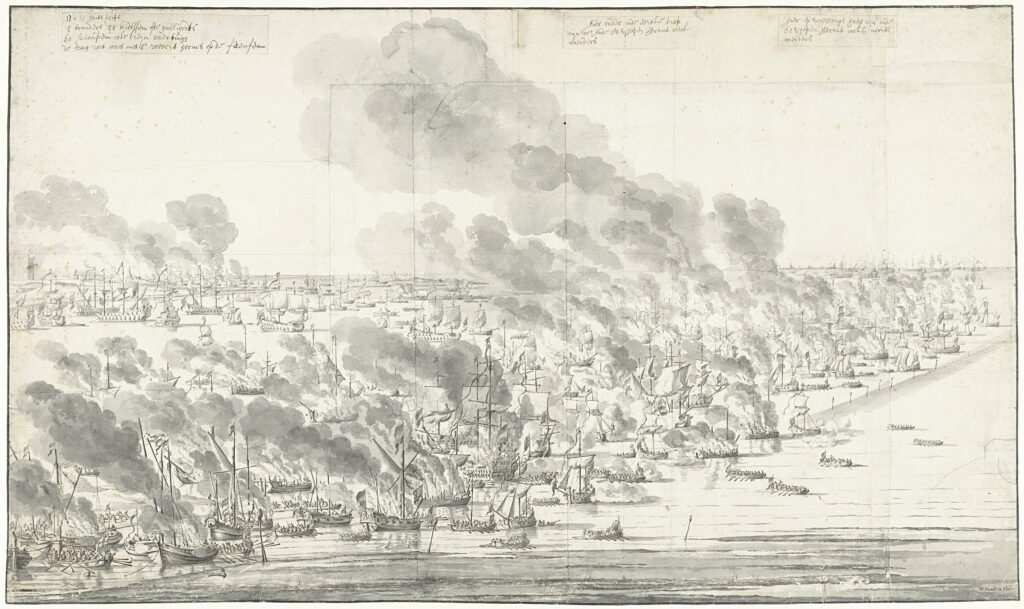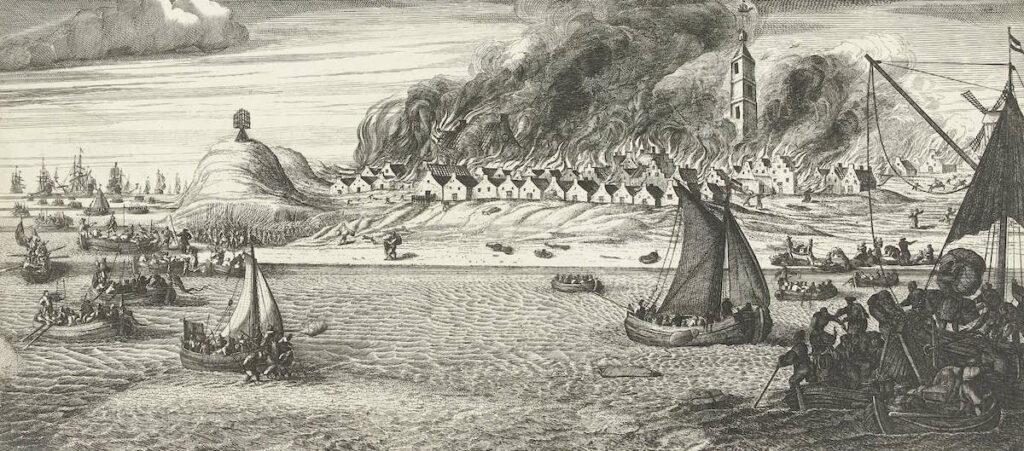Holmes’ Bonfire was a 1666 British naval raid on a Dutch merchant fleet and small town. The British burned the town and sank 150 Dutch merchant ships, but lost only a half-dozen men and killed about as many. Thus, using a sack based on Holmes’ Bonfire at the gaming table lets you play for high stakes, but without the associated horrors and high body count typically associated with a sack.
The raid was part of the second Anglo-Dutch war (1665-1667), a fairly unremarkable tussle for economic and political advantage between England and the Dutch Republic. The war was fought primarily by the two sides’ fleets, as they sallied forth to do battle in the narrow waterspace between Britain and the Netherlands. The war was technically a Dutch victory, but effectively a draw.
In August of 1666, British Rear Admiral Robert Holmes was dispatched to raid the Dutch islands of Vlieland and Terschelling. A Dutch traitor had told the British that the islands were full of plunder and largely undefended, except for several dangerous shoals. The islands were a stopover point for Dutch merchant ships coming to and from the East Indies. Holmes’ orders were to plunder the island’s storehouses, burn the ships, and retreat safely home to England.
Holmes’ scouting determined the reports to be only partially true. There were 170 Dutch merchant ships anchored in the harbor, guarded by only two small warships. But the promised storehouses were small. Holmes decided to set aside the ‘looting’ part of his orders. The shoals prevented Holmes from bringing his seven larger, deep-drafted ships along on the raid. Instead, he attacked with the 28-gun HMS Pembroke (tiny by the standards of the time) and five fireships: inferior ships unsuitable for combat, loaded with flammable materials and a skeleton crew, to be rammed into the enemy, set aflame, and abandoned.

The Pembroke and the fireships sailed right over the shoals and directly into the unsuspecting Dutch fleet. One of the fireships rammed directly into the larger of the two Dutch warships and burned her right down to the waterline. The crew of the other Dutch warship fled. Three English fireships set ablaze three Dutch merchantmen. Meanwhile, the English deployed boats from their seven larger warships sitting out the fight. These smaller boats sailed among the Dutch merchant ships, burning them as they went. The Dutch tried to run, but a southwesterly wind forced them right into their attackers. The Dutch sailors abandoned their ships, and the English let them flee. In the end, only nine Dutch ships escaped.
The next day, Holmes landed his troops and marched on the town of West Terschelling, which he described as containing about 1,000 houses. The locals fled well ahead of the English advance. Holmes ordered his men to burn the warehouses, but observed they seemed to be taking their sweet time doing so – probably looting the town. Holmes feared the Dutch navy might be mobilizing against them at this very moment, so he hurried his men along by setting alight some buildings on the eastern side of the town. It had been a very dry summer, so the admiral’s plan worked a little too well. Within half an hour, the whole town was on fire. Only thirty houses survived. Holmes’ force retreated back to England without further incident.
The Dutch were outraged over the burning of West Terschelling. Three weeks later, London suffered its own Great Fire, destroying almost all of the old city. Dutch commentators were not slow to blame the event on divine retribution for West Terschelling.

Having your PCs be present at an event based on Holmes’ Bonfire could be a lot of fun. All it requires is a seacoast and a few merchant ships. Dangerous shoals, a large merchant fleet, and fancy storehouses are nice, but not required. Having the PCs be among Holmes’ party is probably not a good idea; uncontested victories taste sour. But if the PCs happen to be present in a small trading port, a raid like this could arrive unexpectedly. During the raid, there are several plot hooks available to the party.
During the attack on the Dutch fleet, the PCs can sail out in a small boat to rescue sailors swimming to shore. If they’re feeling daring, they can even try to buy the Dutch ships time to flee by fighting one or more of the British small boats. Opportunistic PCs may be tempted to loot one of the Dutch merchant ships whose crew has abandoned it well before the British reach it to set it aflame.
During the attack on the town, the PCs might help the townsfolk flee, find a way to dissuade the English from pursuing them, or even try to loot the town ahead of the soldiers.
After your equivalent of West Tershelling is aflame, you’ll need to decide if your British equivalents are simply going to pack up and leave. If not, the PCs could easily become involved in the effort to get rid of them. The PCs could try to negotiate with Holmes. If they can figure out what he wants, they might be able to help him get it so he can leave. More skittish PCs might try to get word to the local governor that she needs to summon her army. And creative PCs are likely to come up with some off-the-wall solution to drive the British away.






